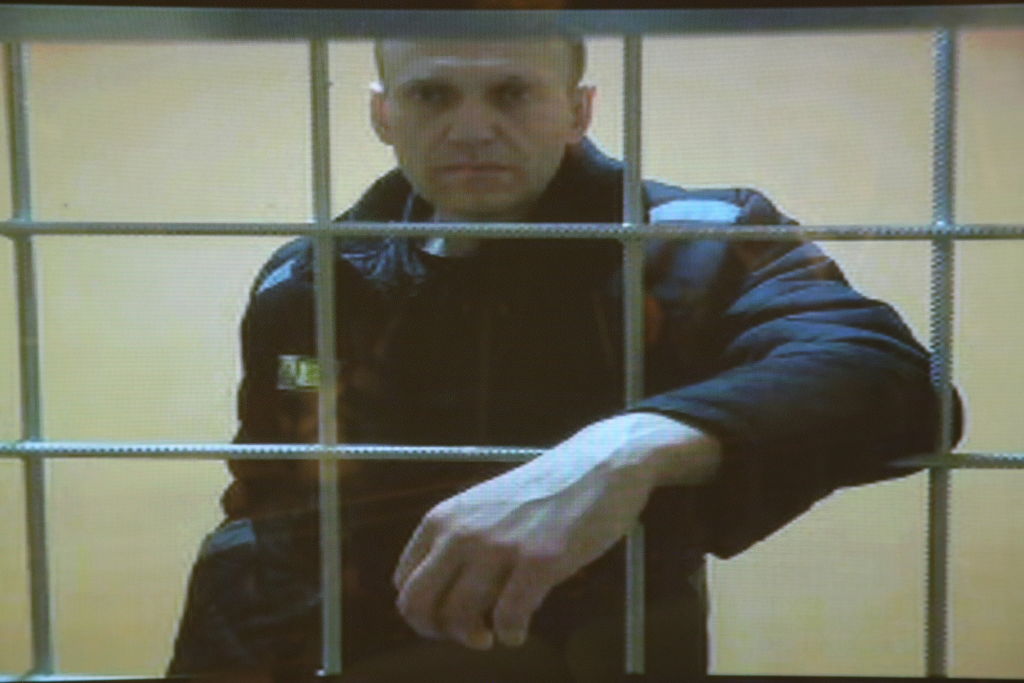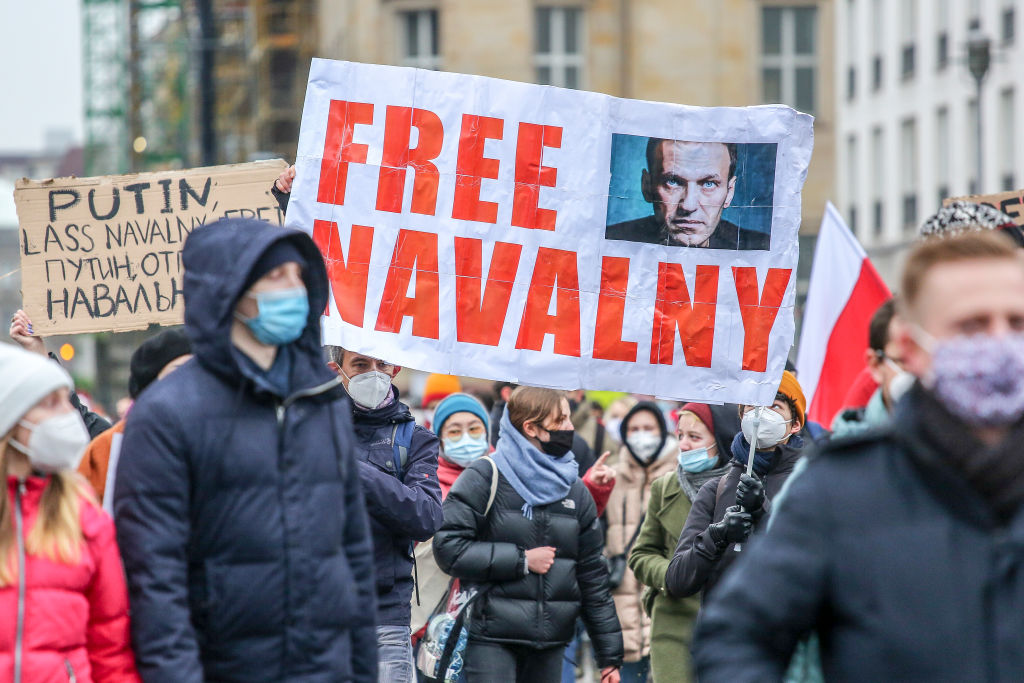
Over the past couple of years, the name Alexei Navalny has become known outside of Russia. You’ve read about him founding the Anti-Corruption Foundation to investigate the illicit wealth of Russian elites, getting detained numerous times over the years for attending protests against Putin’s regime, running for president in 2018, being poisoned in 2020, miraculously recovering and going back to fight for the better future of his country.
For you, these are just headlines around the world. For me, it’s the reality.
My name is Dasha Navalnaya. I’m a 21-year-old studying at Stanford University. My father—Alexei Navalny, became Vladimir Putin’s number one enemy by fighting the Kremlin’s corrupt and bloodthirsty regime.
Since 2011 the Anti-Corruption Foundation has been exposing the corruption of high-ranking government officials in Russia, one of the most famous investigations being Putin’s Palace. In August 2020, my father survived a chemical weapon poisoning with Novichok performed by FSB officers and, several months after recovering, successfully investigated his own assassination attempt.
Despite the dangers he faced, in January 2021, Alexei Navalny went back to Russia and was unlawfully arrested at the airport. He has since been serving his time in prison eye-to-eye with Putin’s jailers. Shortly after his arrest, the Anti-Corruption Foundation was recognized as an extremist organization in Russia. Its team members were prosecuted and forced into exile.
We all know that prison isn’t a place where you want to end up anywhere in the world, but, the conditions of the Russian prison system are far worse than those in the U.S. or Europe. There is nothing like a Russian prison to cripple even those in perfect health. My father survived a chemical weapons poisoning, which took a toll; he spent more than two weeks in a coma and over a month in intensive care. The rehabilitation took months. Shortly after the imprisonment, he started experiencing back pains and a gradual loss of control in his legs. He had to endure a 24-day hunger strike just to get access to medical help.
Barely surviving the hunger strike did not break his spirit—nothing ever will. But the solitary confinement conditions he is now subject to are clearly aimed at mentally breaking and physically killing him. My dad’s “residence” for over two months now – a 7 by 8 feet punishment cell, which is more of a concrete cage for someone of 6 ‘3 height. He spends days sitting on a low-iron stool (which exacerbates his back pain), with a mug being the only thing he’s allowed to keep. Even his bed is fastened to the wall from 6 AM to 10 PM.
Read More: The Man Putin Fears
On Thursday, November 17th, my dad was moved to the strict regime in a solitary housing unit. The rest of the prisoners live in barracks, which they can freely exit, but he will be permanently locked in the solitary cell. He wrote: “It is a regular cramped cell, like the punishment cell, except that you can have not one, but two books with you and use the prison kiosk, albeit with a very limited budget.” These new conditions will also prevent him from receiving any family visits—they are all completely banned. Being able to have a second book is definitely a bonus for an extremely fast reader like my dad.
I am proud to be my father’s daughter and walk tall knowing that despite the inhuman conditions, he has been standing up against Putin’s war in Ukraine and calling on the Russian people to do everything in their power to fight it.

“Everything has a price, and now, in the spring of 2022, we must pay this price. There’s no one to do it for us. Let’s not ‘be against the war.’ Let’s fight against the war,”—he stated during the trial in March. It is now December, and since August my father has spent 78 days in the punishment cell, serving eight solitary confinement terms back-to-back.
Why was he sent to the solitary confinement punishment cell and now to a long term solitary confinement cell, you ask? Among the violations from the colony administration, my father has been sent to the punishment cell because: unbuttoning jumpsuit” (it is physically impossible to button as the jumpsuit is a few sizes smaller than his), refusing to mop the fence,” and “sweeping the exercise yard poorly and insulting the Сriminal Investigator Lieutenant by addressing him by title and surname instead of his first name and patronymic.” The most recent is simply being an “egregious offender” worthy of the “cell-type” room.
The real reason behind the constant punishments is and always has been, of course, Navalny’s condemnation of the Ukraine war and his opposition to the Putin regime. My father uses every appeal hearing as an opportunity to make an anti-war statement. During his recent hearing, he said: “Your Honor, I declare that I am an innocent person. And I believe that I and others like me did everything possible to prevent what is happening now. And we will continue to do so. And I call on all citizens of Russia to fight this regime, this war, and mobilization.”
“I will spend as much time in a punishment cell as will be necessary to defend my right to speak out against a historic crime Putin is committing” —is a sadly self-fulfilling prophecy in his case. The prison administration made it clear there’s no such thing as a glimpse of the rule of law when it comes to Navalny.
The latter is also attested by the fact that my father’s attorney-client confidentiality privilege no longer exists. The penal colony administration had simply decided to waive it. In recent months, all communication he has had with his lawyers goes through the prison administration. The window in the visiting room has been covered with an opaque film, so lawyers can only hear a voice and see their client’s silhouette as they discuss the defense in the new criminal cases against him (he currently is facing up to 30 years behind bars). My dad’s lawyers no longer have a visual understanding of his health and physical conditions. This is unique even by the low standards of the Russian judicial system.
To me, Alexei Navalny is not only a determined, hard-working, and charismatic leader but also a funny, caring, and incredible father. He taught me how to ride a bike; he helped with math equations and grammar questions when I simply could not wrap my elementary school brain around the concept of semicolons. In middle school, when I made my first attempt to cook porridge, when it turned out to be way too salty, my dad smiled, didn’t discourage me, and ate the whole thing. For hours he helped me learn the poem “The Prophet” by Alexander Pushkin so well it is still engraved in my mind. Every September, he walked my younger brother and me to school on the first day of class. My dad was there for our competitions, concerts, and graduations. And has always written me or anyone he holds close a loving and hilarious letter on our birthday if he was arrested and couldn’t be with us in person.
Now he can’t even do that.
Our family has always taken pride in its optimism: we prefer jokes over complaining when the worse comes. We’ve seen a lot over the years and made sure not to take it too close to heart. My father was detained at least once almost every year between 2011 and 2021, with time spent in prison longer and longer. My mother was detained and tried; my uncle served 3.5 years in prison for the simple crime of having the same last name. Our whole family, including my grandparents and great-grandparents, has been harassed and unlawfully prosecuted many times. Not to mention the “good old times” when the FSB poisoners were close to killing my mother and almost killed my father
It is impossible to get used to the idea that your loved ones can be imprisoned or killed at any time for a made-up reason, but over time it became part of our family routine. “So, I assume you won’t be coming to dinner tonight?” I’d ask my dad whenever he was getting ready to go to a protest. He would respond with a snicker.
The Russian regime has always been based on corruption and it is now based on war – for Putin, these are the two prerequisites for staying in power. That is why he is ready to destroy anyone who dares to expose them. And he treats my father with a personal hatred—as his most implacable opponent for many years.
As you read these lines, Navalny is in mortal danger, but he continues to stand by what he believes in. He has proven willing to sacrifice his freedom, health, and even his life to see Russia become a democratic, prosperous country. And right now, even from prison, he is fighting to make it peaceful. By his example, he supports and inspires millions of Russians who, like him, are unwilling to tolerate war and injustice.
Putin must be defeated. He is a threat not only to Russia and Ukraine but to the world. The very essence of authoritarian power involves a constant increase in bets, an increase in aggression, and the search for new enemies. In order not to lose in this struggle, we must unite.
My father is one of the leaders of this struggle, and he must be out there. He challenges Putin every day, but together we can ensure that his efforts are not in vain and that his words are heard around the world. I now turn to world leaders and ask them to support my call to the Russian government to release my father.
Let’s all strive for a better, more prosperous global future where we can choose our own leaders. Free Alexei Navalny!
More Must-Reads from TIME
- Cybersecurity Experts Are Sounding the Alarm on DOGE
- Meet the 2025 Women of the Year
- The Harsh Truth About Disability Inclusion
- Why Do More Young Adults Have Cancer?
- Colman Domingo Leads With Radical Love
- How to Get Better at Doing Things Alone
- Michelle Zauner Stares Down the Darkness
Contact us at letters@time.com